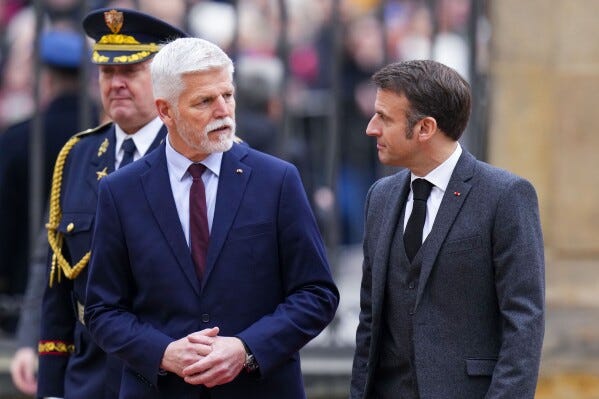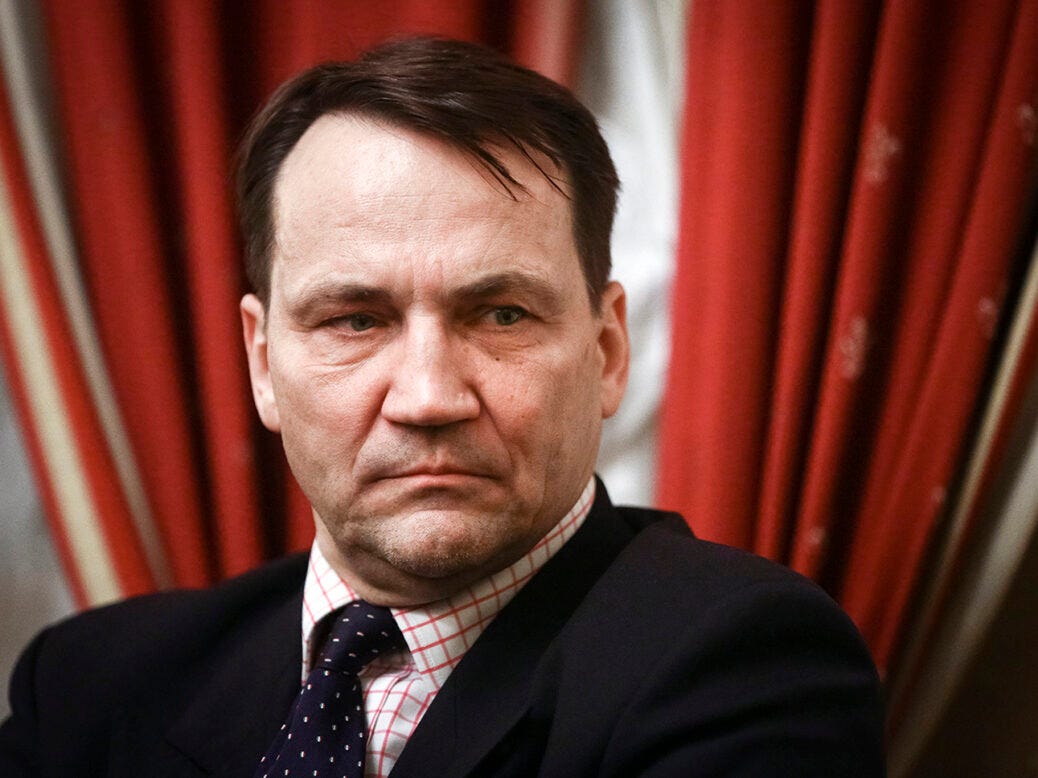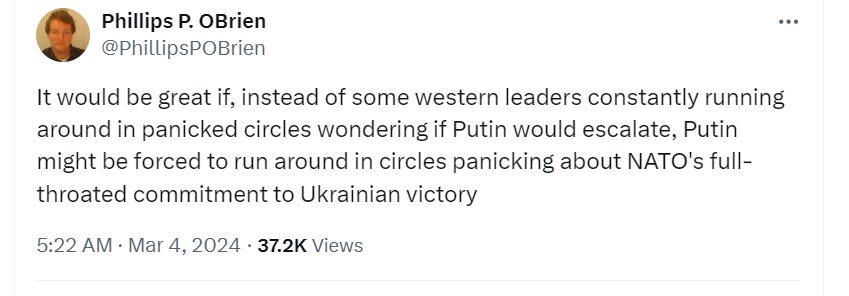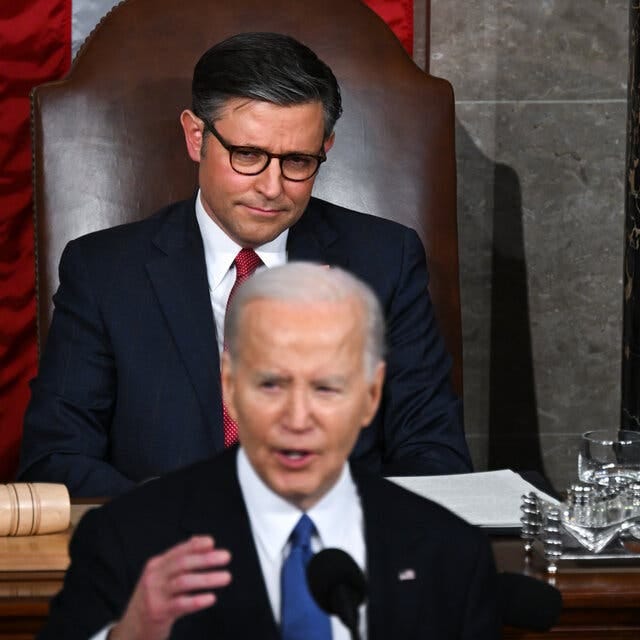The implications are profound. Instead of backing down, Europe is saying it recognizes the Russian threat and intends to meet it. That they are the ones he better not cross, not the other way around. With Russia having drawn down much of its weapons inventory, its troops slaughtered across the Donbas and southern Ukraine, its post Avdiivka advances thwarted, its air force now a turkey shoot target and its Black Sea Fleet scampering to safer waters, more than just the narrative is changing. JL
Phillips O'Brien reports in his substack:
Its been two weeks since President Macron mentioned European forces being deployed in Ukraine. Until then, NATO troops in Ukraine had been taboo. It was a sign NATO is no longer dancing to Putin’s tune (in) defining Europe’s interest. This week other European states broke from Russian reflexive control, (including) the Czechs and Poles. European troops might go to Ukraine now to do training, seemingly impossible before. The Polish government said it was not inconceivable for European forces to be deployed in Ukraine. We are hearing the breaking of Putin’s attempts to control the narrative. Putin sees his nuclear threats failing and has to wonder if he might do something resulting in direct European support.Last weekend’s update introduced some people to the idea of Reflexive control. It spread around a little (a few hundred people signed up to the substack after it), so the concept obviously hit a nerve. I wonder if what happened this week revealed (in Europe at least) that Russia’s reflexive control over the terms of the security debate was cracking (at least in some European states). Also a big week in US politics with implications for Ukraine—and stories coming in that last night Ukraine launched a mass UAV attack on Russian soil.
Was this the Week Reflexive Control Broke?
Its been fewer than two weeks since President Macron first mentioned publicly that he could imagine European forces being deployed into Ukraine. Its was an extremely important moment—for the leader of a major European power to state openly that he could imagine making such a decision. Until that time, the idea of European or NATO troops going into Ukraine had been taboo. It was a sign that Macron, for one, was no longer dancing to Putin’s tune when it came to defining what is in Europe’s interest.
In many ways what has happened this last week is even more important. It was as if Macron had broken an important psychological barrier—one that had been holding back other European leaders.
If you remember back when Macron first made his speech, the reaction in one of Europe was fear and uncertainty. On February 26, a day after Macron made his gambit, it was widely reported that many European leaders had rejected the French President’s position. It was stated in a large number of articles that other European state’s were aghast at Macron’s statements. Almost immediately quotes were procured which seemed to show that the German, Slovak, Croatian, and Italian leaderships rejected even the idea that European forces could appear in Ukraine. Another article, by the BBC, which was entitled Nato allies reject Emmanuel Macron idea of troops to Ukraine went even further. In it, it was claimed that the Polish and Czech leaderships, who had heretofore been some of Ukraine’s strongest supporters, were also opposed to the French move.
It was fascinating to see how almost desperate much of the media was to feed the narrative that sending European forces into NATO would be a red-line too far. There was talk, once again that Putin was making nuclear threats, that he would never stand for it, that Europe had caved in, etc, etc. In one quite shameful article, from CNBC, it was even claimed that Macron had made a terrible “gaffe” in ever mentioning the possibility of troops in Ukraine, and that the Russian leadership was “relishing” Macron’s supposed humiliation as he was abandoned by his European partners. To give you an idea of just how much the article seemed to be written under the power of Russian reflexive control, this is a verbatim cut and paste of its opening sentences.
Russia appears to be relishing the gaffe French President Emmanuel Macron made this week in suggesting that NATO countries discussed the possibility of Western ground troops being deployed in Ukraine, saying such an eventuality could not be “ruled out.”
Macron’s suggestion was widely — and very publicly — rejected by NATO member countries Tuesday. The United States, Germany, the U.K., Spain, Poland and NATO Secretary-General Jens Stoltenberg were among those denying that sending ground troops into Ukraine was an option.
Of course, if you’ve been reading this substack, you would have realized that all these claims were BS. I’ve been saying for well over a month now, that it was more than conceivable European powers would choose to intervene for Ukraine. On the same day that this dreadful CNBC article was published, I released this substack with the title: European Troops in Ukraine--Dont Rule it Out.
The issue of sending European forces to help Ukraine was never one to be dismissed—it was always a possibility. In fact it has become more of one as the USA has stepped back and withdrawn aid. Europe is now faced with a terrible dilemma—watching Ukraine potentially run out of ammunition, or stepping in and helping Ukraine more directly.
The real reason the vast majority of people rejected the second option (when its always been a possibility) is because Putin had gotten into their minds with his threats. He kept saying it was inconceivable, and would result in nuclear war, and thus many just seemed to think it was true.
Well its not—and this was the week that many important European states seemed to break free from Russian reflexive control as well. Maybe the two most important were the Czechs and Poles, who only nine days ago were supposedly running away from Macron, started identifying more and more with the position of the French President. Three days ago, the Czech President, Petr Pavel, after meeting with Macron, was supportive of the French President’s move. While saying he did not think Czech “combat” troops would be sent to Ukraine, Pavel actually endorsed Macron’s statement that all options needed to be on the table. Interestingly, he mentioned that European troops might go into Ukraine itself now to do training—something that publicly would have seemed impossible only the week before.
Yesterday the Polish government went even further. The Foreign Secretary Radek Sikorski, said publicly it was not inconceivable for European forces to be deployed into Ukraine. At the same time, Polish Prime Minister Donald Tusk, used extremely war-like rhetoric, when discussing the present reality. The old war was over, a dangerous new one had been born, and European states needed to understand that.
"The times of blissful calm are over. The post-war epoch is gone. We are living in new times, in a pre-war epoch. In fact, for some of our brothers, it is no longer even a pre-war time. It is a full-scale war in its most cruel form. It is not our fault that our daily vocabulary includes, once again, such words as fighting, bombings, rocket attacks, genocide,"
What we are hearing, is the breaking of Putin’s attempts to control the narrative—and that is why this might be the week that reflexive control started to end. Returning to Sikorski’s comments, its clear the Polish Foreign Secretary wanted to align Poland with what Macron said, precisely because it was a rejection of the world Putin had made for European leaders. Indeed, Sikorski went so far as to say that western leaders needed to hoist Putin on his own petard, by actually finding ways to escalate the war against him.
"That is why I applaud the recent French initiative. Because, in my opinion, there are good intentions behind it, namely to make the Russian president ask himself what our next step will be, instead of allowing him to be certain that we will not do anything creative and to plan his own scenarios," Sikorski said.
In his opinion, the West should "implement creatively defined and asymmetric escalation".
This is therefore an extremely important moment, but of course not everyone can free themselves from living in Putin’s world. If the French, Poles and Czechs are going one way (and the Finns and Baltics are already there), the Germans remain very much operating under a form of reflexive control.
You can see that in the growing horror of some elements of the German government as Macron’s gambit started to snowball. German defense secretary, Boris Pistorius, got very defensive. After Macron called on unnamed European states not to be “cowards”, Pistorius shot back with hurt feelings, saying such language was “counterproductive”.
"We don't need really, from my perspective at least, talk about boots on the ground or having more courage or less courage," Pistorius told reporters during a press conference with his Swedish counterpart Pål Jonson.
"This is something which does not really help solve the issues we have when it comes to helping Ukraine,"
But this is a great change in a week. 9 days it was supposedly Macron who was on the defensive as no one stepped forward to support him, now its the Germans acting defensive and saying they don’t want their feelings hurt. The direction of travel is clear, and it is heading Macron’s way.
And this is so important. It will add uncertainty and worry to Putin calculations. He will see his nuclear threats failing to work and he will have to wonder if Europe might intervene and destroy his calculations. Instead of Ukraine’s supporters running around like chickens with their heads cut off, wondering if they might be pushing Putin so far, he will wonder if he might do something that will result in more direct European support. This is all for the good, as I said last week.
Politics and Ukraine in the US
For those of you that missed it, Donald Trump sewed up the Republican nomination on Tuesday. With one exception (go Vermont) he won every state in the Super Tuesday primary slate, and his leading (and pro-Ukraine) challenger, Nikki Haley, withdrew from the race. The Republican Party thus came even more under Trump’s sway, which was made obvious when his daughter-in-law, Lara Trump, was made party vice-chairman. She has been talking about using Republican Party funds to pay Trump’s legal bills—making the party basically a wholly owned subsidiary of Trump Inc. The weakness of opposition to Trump in the party was made even more clear when Mitch McConnell bent the knee and endorsed Trump for president. McConnel had been one the strongest Trump critics in the party.
This is bad news for Ukraine in the here and now. The Speaker of the House, Mike Johnson, who has already revealed a distinct lack of backbone vis a vis Trump, will only cower more at the prospect of offending him by allowing for a vote on Ukraine aid. It has lessened the odds of a straight up and down vote in the House.
Johnson’s desire to please Trump was seen during President Biden’s State of the Union address on Thursday evening. In it, sitting behind Biden, Johnson’s face was a series of grimaces and frowns, that became one of the memes of the night.
If Johnson holds firm in his Trump-like devotion, the only way to get the aid to Ukraine might be a discharge petition. However, that will require a number of Republicans to show real courage and oppose Trump.
I’m more worried than I was lost weekend.
I suppose the good news for Ukraine was that Biden delivered a powerful speech. This will probably help answer many of the critics who were questioning his mental acuity. That could lead to his re-election and more aid to Ukraine later. However in the short term much rests on Johnson, and with Trump so ascendant, its worrying in the short term.
Ukrainian mass UAV attack
As this is being written, there were stories of a mass Ukrainian UAV attack (40+ units) against military production targets inside Russia. Its far too early to assess the damage from these, though it looks like there were some fires and explosions in Taganrog and Kursk. At least one report claimed that Ukraine might have been attacking the facility where repairs are made on their dwindling stock of A-50 aircraft.
This is all for the good. I’ve been hearing that Ukraine is making advances in both the number and capabilities of its UAV force, and should soon have the ability to launch more regular attacks of this type. As these are Ukrainian systems, they can also be used to attack targets deep inside Russia (no reflexive control here). Its also heartening to see Ukraine bui;ding up reserves to launch such attacks. It shows the signs of being well prepared and executed.
Its early days, but we can probably expect more of these.
























0 comments:
Post a Comment